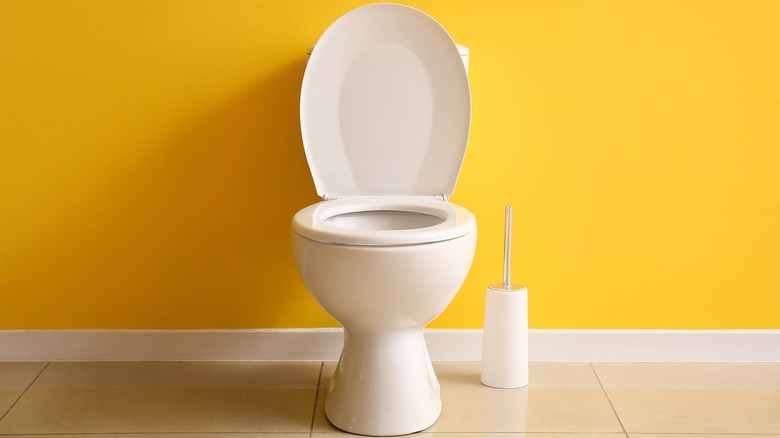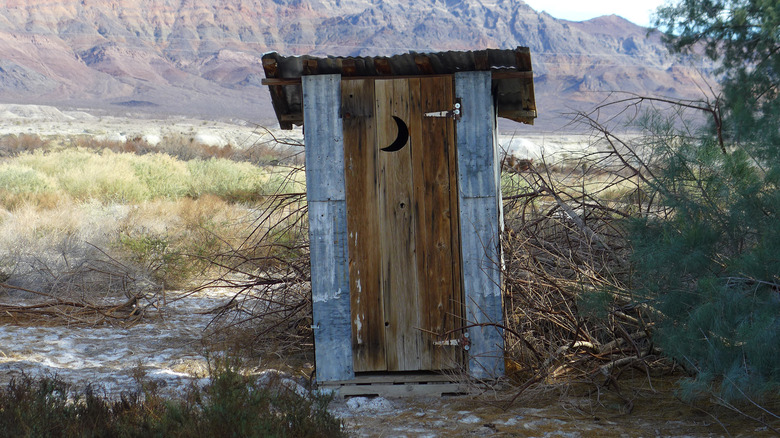How Much Poop Can The Human Body Hold?
We all know people are full of it — some more than others. They walk around, full of it. They sit on shared public chairs, full of it. They smile at you while it builds inside and prepares for ejection. It swells in the bowels of diplomats, CEOs, and lawyers same as Instagram models and your favorite singer. Estimates range from 92 days to 416 days to three whole years of life spent on the ceramic throne ridding ourselves of smelly brown baggage. But how much poop are we full of, exactly? How much is readying for deposit into the watery depths at any given moment? Well, grab the toilet snake, whip out your colonic tube, zip up the hazmat suit, and prepare to plunge deep and long into fecal territory.
Live Science relates a telling measurement that puts the rest of our numbers into perspective: two centimeters. Every second of every day the human body generates two centimeters of poop. Bodily waste processing is thankfully more complicated than that, otherwise, you'd produce five feet of poop every 76 seconds — the entire length of a typical large intestine. And yet, weight-wise, people produce about 312 pounds per year (the same weight as a baby elephant), 6,552 pounds by age 21 (two female hippos), and 25,896 pounds by age 83 (a trailer-less semi-tractor). In the end, folks hold — and lose — about one ounce of poop per 12 pounds of body weight per day, per eMedicineHealth, or 14 ounces on average.
Constipation woes
The average amount of stored human poop is about 14 ounces, but Health Partners describes several factors that influence poop quantity, and therefore poop retention, including exercise, diet and type/ratio of nutrients, water, age, medication, stress, and more. Meanwhile, Mind Body Green discusses links between hormone levels and bowel regularity, especially related to women's monthly cycles. And of course, if someone has a disorder like irritable bowel syndrome (IBS), all bets are off.
But above all else, constipation — or a lack thereof — determines how much poop a person carries inside. Live Science says that about 30% of poop is composed of fluids and the other 70% of solids. If poop moves through the body too quickly, not enough water gets absorbed and poop becomes soft, as My Cleveland Clinic says. If poop moves too slowly, more water gets absorbed and poop becomes firm. The longer poop stays inside, the more water gets absorbed, the firmer the poop gets, and the harder it is to poop the poop out. And the longer you're constipated, the more poop accumulates in the body's exit apparatus: the colon.
However, Dr. Darren Brenner, a professor in the gastroenterology division at Northwestern's Feinberg School of Medicine told Politifact that major poop accumulation isn't really a thing. According to Brenner, "there is unlikely to be more than a few pounds of stool in the colon," even for constipated people.
However, in a rare case, Inverse describes how a 22-year-old Chinese man stayed constipated his entire life. In 2017 doctors surgically removed almost 30 pounds of feces from inside his inflamed, disturbingly colossal colon.
A poo-packed globe of billions
With so many humans alive, each full of so much poop, the whole world is full of it. On Vox, gastroenterologist Robynne Chutkan describes how different people in different parts of the world produce different compositions of poop depending on environmental and dietary factors, with people in developing countries tending to eat more fiber. But, even taking such differences into account, even as far back as 2011 Live Science recalled that the world is simply full of too much human waste, which can have serious environmental consequences. Back then, there were 7 billion people alive — now it's already over 8 billion. Per Global Citizen, we're looking at nearly 10 billion by 2050, each carrying an average of 14 ounces of poop inside. That's a lot of sewage and sanitation infrastructure, aside from the 8,750,000,000 pounds of feces collectively carried around every day. Good thing the ground is so sturdy.
While there's no way to disintegrate poop into harmless atoms or teleport poop out of our colons into a fecal scow circling in orbit (that we hope never falls to Earth), we can at least all tend to our own gut health. After all, no one wants to turn out that guy in China stuffed with 30 pounds of brown sludge. Aside from regular exercise and healthy eating habits, Liberty Clinic even outlines the benefits of colonic irrigation for the rectally daring. That might be the only way to make sure you're not full of it.


